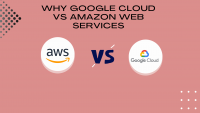Categories
Tags
-
#Google
#cloudcomputingservices
#CloudComputing
#MachineLearning
#AWS
#cloudsecurity
#web designing course
#cloudcomputingsystem
#machinelearningengineer
#googlecloudplatform
#gcp
#googlecloudtraining
#cloudcomputingtraining
#cloudcomputingcourse
#machinelearningtools
#azurecloud
Archives
Recent Videos
Let's talk!
AWS vs GCP - Products and Services
-
Posted by harish v Filed in Technology #Google #cloudcomputingservices #CloudComputing #MachineLearning #AWS #cloudsecurity #cloudcomputingsystem #machinelearningengineer #googlecloudplatform #gcp #googlecloudtraining #cloudcomputingtraining #cloudcomputingcourse #machinelearningtools #azurecloud 17 views
What is Google Cloud Platform(GCP)?
Data management, online video and web delivery, as well as the usage of AI and machine learning tools are just a few of the activities that the public cloud provider GCP offers a variety of computing services for. Customers have access to the computer resources housed in Google's data centres all over the world for free or for a fee per use.
What is Amazon Web Service (AWS)?
The online platform known as Amazon Web Service provides scalable and cost-effective cloud computing solutions. AWS is a well-known cloud computing platform that offers a variety of on-demand services to help businesses scale and grow, including computing power, database storage, content distribution, etc.
Why Google Cloud vs Amazon Web Services
If you intend to employ cloud services, you will undoubtedly find Google Cloud, Amazon Web Services, and Microsoft Azure as your suppliers.
These cloud powerhouses in the tech sector are well-known. For more than ten years, both companies have controlled their respective marketplaces. They are regarded as industry leaders because of their strict pursuit of innovation and quality. They all possess a wealth of technological expertise that is essentially unmatched.
Given their various technological backgrounds, it is not surprising that they have developed cloud computing platforms that are at the top of their sector. Listed as the market leaders once more by Gartner in their Infrastructure as a Service (IaaS) Magic Quadrant for September 2020 are Google and AWS.
AWS vs GCP - Products and Services
To help clients use cloud technology efficiently, AWS and GCP offer more than 100 goods and services in respective catalogues. We'll look at how the well-known services that AWS and GCP offer to its clients differ from one another.
1. GCP Compute Engine vs. AWS EC2
Scalable virtual machines are provided by Compute Engine as a compute and host service to operate the workload activities and applications of clients
- GCP provides four different types of compute engine instances, each with special characteristics:
- General Purpose - It is used for general workloads and has a good price to performance ratio.
- Compute Optimised – It is optimised for compute-intensive workloads and offers greater performance than general-purpose instances.
- Memory Optimised - It is optimised for memory-intensive activities and provides up to 12TB of memory per core.
- It was developed for GPU-intensive operations and parallel processing. Optimized for acceleration
AWS provides various EC2 instance types, many of which are very similar to the list above.
- Instances for general usage provide a range of characteristics in equal measure, including networking, computing, and storage. General Purpose instances are available for web servers.
- Compute-optimized instances are suited for high-performance tasks that call for quick processors and lots of processing power, such as movie encoding devices, game servers, etc.
- When processing a lot of data at once, memory-optimized instances are the best option. These EC2 instances are by default EBS optimised and run on the AWS Nitro System.
- Storage Optimised instances provide high sequential and random read/write operation capacity. These are typically used for workloads that read and write enormous volumes of locally stored data.
- GPU/Accelerated instances are used for processing intensive tasks like floating-point calculations and graphics. Accelerated Instances use additional processors and dedicated GPUs to boost hardware performance.
2. GCP Kubernetes vs AWS Kubernetes
Applications can be scaled and deployed with the help of the open-source Kubernetes container management and orchestration technology. Programs can execute simultaneously with all of their dependencies thanks to resources called containers. Kubernetes provides container management, portability, and efficient resource consumption for the development of applications. Running Kubernetes on GCP is easier as a result of Google's early involvement in the project. The Elastic Kubernetes Service on AWS does not come with a resource monitoring tool, in contrast to Stackdriver from GCP.
3. GCP Cloud Functions and AWS Lambda
Serverless computing is a typical Function-as-a-Service example that does not involve the deployment of virtual machine instances. Lambda is the name of the serverless product from AWS, whereas Cloud Functions is the name of the serverless product from GCP. Google Cloud Functions only supports Node.js, but AWS Lambda functions support a number of languages, including Java, C, Python, etc. Cloud functions are less complicated to execute than AWS Lambda since they include fewer steps. On the other hand, AWS Lambda outperforms Google Cloud Functions by 0.102 million executions per second.
4. Storage using AWS S3 and GCP
A cloud storage service is provided by both Google and Amazon. Let's look at each component separately:
AWS S3
- Each item is stored in a separate bucket that can only be accessed with the developer-supplied keys.
- An S3 bucket can be stored in one of a number of regions, depending on factors like proximity, availability, latency, and cost-related considerations. AWS has a vast worldwide network of linked data centres spread across every continent. It will unavoidably give better performance and speed while storing and retrieving data over vast distances.
GCP Storage
- GCP storage provides high availability.
- It makes data consistency across regions and locations possible.
- Additionally offered are projects for Google Developer Console.
5. GCP vs. AWS Pricing
AWS offers three unique pricing tiers or strategies.
- As you go payment
The approach merely values the company's current resources, which allows for flexibility and adaptation in resource use.
- When you commit, save.
With this feature, you can benefit from discounts provided if you agree to use AWS services for a specific period of time, such as a full year.
- Utilize more while paying less.
AWS encourages higher use of its services by tiering the pricing. This suggests that a service gets more expensive the more you use it, and the opposite is also true.
GCP offers pricing options that are somewhat comparable to those of AWS.
- Pay just what you really use.
Similar to AWS's Pay-as-you-go model, you are only billed for the resources you really utilise. It is hence on-demand pricing.
- Reduce burdens by paying in advance.
The model saves money for the consumer if they consent to utilise the service and buy resources in advance at a discount.
- Maintain financial restraint.
Many of the cost management tools made available by GCP are free to use and provide valuable information like pricing and usage forecasts along with intelligent suggestions on how to cut costs. These allow customers to review their spending and make any required adjustments.
- Price Estimator or Calculator
Using the price calculator tool offered by GCP, customers can make modifications to their estimates and estimate the final cost of the goods and services before subscribing for them.
6. Machine Learning in AWS vs. GCP
To design, train, and test a machine learning model, you can use the portfolio of cutting-edge technologies from AWS and GCP. Three effective tools are at AWS's disposal: Amazon SageMaker, Amazon Lex, and Amazon Rekognition. Contrarily, Google gives users a choice between two primary services: Google Cloud AutoML for beginners and Google Cloud Machine Learning Engine for more complex tasks and finer control. Two other potent machine learning tools that GCP offers are Vertex AI and Tensorflow.

